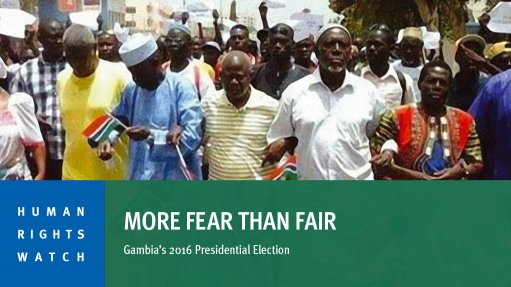
In December 2016, Gambians will go to the polls to vote for a president for the fifth time since current leader Yahya Jammeh came to power in a 1994 coup. Over the past 22 years, President Jammeh and the Gambian security forces have used enforced disappearances, torture, intimidation, and arbitrary arrests to suppress dissent and preserve Jammeh’s grip on power. Ahead of this year’s election, the government has repeated these tactics, with a crackdown on opposition parties, particularly the United Democratic Party (UDP), that has all but extinguished hopes for a free and fair election.
The government’s crackdown began on April 14, when prominent UDP activist Solo Sandeng led a rare public protest calling for electoral reform. He was arrested by Gambian police, taken to the headquarters of the National Intelligence Agency (NIA), and brutally beaten to death. Many protesters arrested with Sandeng were also tortured at the NIA; several were beaten and doused in water while being forced to lie on a table.
Gambian authorities have in 2016 arrested more than 90 opposition activists, including those arrested with Sandeng, for participating in largely peaceful protests. Courts have convicted 30 opposition members and sentenced them to three-year terms, including UDP leader Ousainou Darboe and many of the UDP leadership. Jammeh has also repeatedly threatened opposition parties. “Let me warn those evil vermin called opposition,” he said in May. “If you want to destabilize this country, I will bury you nine-feet deep.”
Based on more than 100 interviews conducted in Gambia, Senegal, and the United States from March to September 2016, this report examines the chilling effect of the government’s targeting of political opponents, journalists, and other dissenting voices on the ability of opposition parties to contest elections on a level playing field. Human Rights Watch interviewed members of political parties, journalists, civil society leaders, lawyers, retired Gambian civil servants, former members of the security forces, international organizations, and foreign diplomats.
Report by the Human Rights Watch